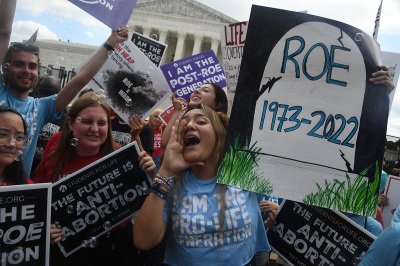Concurring (in part) with the dissent of the Dobbs decision

There are four big takeaways from the Court’s decision in Dobbs overturning Roe v. Wade. 1. Justice Blackmun’s contrived 1973 opinion, being improper judicial legislation, is not legal precedent. 2. Roe’s artificial “viability” test is itself no longer viable. 3. The 14th Amendment never contemplated abortion as a fundamental liberty. 4. There being no constitutional protection, the power of individual states to decide questions of abortion is now fully restored.
Coming as no surprise, dissenting Justices Breyer, Sotomayor, and Kagan took issue with all four points, focusing on 1. the Court’s failure to recognize the right of women to control their own bodies; 2. the potential harm to women who, for the past almost 50 years, have relied on the legal option to have an abortion; and 3. — ominously — the threat this decision poses to other highly personal issues such as contraception and same-sex marriage.
While the majority and concurring opinions went to great pains to say that overturning Roe did not portend a reversal of decisions giving constitutional protection to the use of contraceptives and same-sex marriage, the dissenting Justices were adamant that the majority Justices were being either illogical or hypocritical in denying that possibility. Indeed, Justice Thomas said such cases should be reconsidered (without resort to “substantive due process,” his pet peeve).
The nub of the issue comes where the Court places great weight on the fact that, when the 14th Amendment was ratified in 1868 (ensuring rights for emancipated slaves but evolving into a suitcase full of protected liberties), abortion was not recognized as a fundamental liberty. The dissenting Justices insist that the inescapable logic of such reasoning likewise leads to there being no constitutional protection for contraceptives and same-sex marriage, since neither was considered a fundamental liberty in 1868.
About that, the dissenters are half right.
Since heterosexual marriage (with mixed-race unions being a separate issue) has always been protected by law — inferentially including decisions about procreation — there is no legal reason why the 14th should not protect the use of contraceptives (being only slightly less straightforward for unmarried couples).
By contrast, same-sex marriage doesn’t fit with the fundamental liberties encompassed within the Amendment. The “institution of marriage,” rightly recognized in the gay marriage case (Obergefell) to be a fundamental right “as a matter of history and tradition,” could not possibly include same-sex unions. Despite ancient Greek pederasty and Nero “marrying” his slave, never in human history has any significant culture — Christian, Jewish, Muslim, Hindu, Buddhist, or atheist — given official sanction to “same-sex marriage.”
That it’s the dissenting Justices who point out the logical extension of the majority’s argument is ironic.
The majority Justices may not be hypocritical, but they are certainly inconsistent in maintaining an impenetrable constitutional wall around same-sex marriage while tearing down Roe’s rickety constitutional fence around abortion. And all the more so, given that the case affirming same-sex marriage was significantly reliant on Roe’s now-debunked rationale.
It took judicial courage to overturn Roe. It will require extraordinary courage, not likely found in this Court, to take the next logical step. Maybe in another 50 years … if our morally confused nation still survives.
F. LaGard Smith is a retired law school professor (principally at Pepperdine University), and is the author of some 35 books, touching on law, faith, and social issues. He is the compiler and narrator of The Daily Bible (the NIV and NLT arranged in chronological order).




















